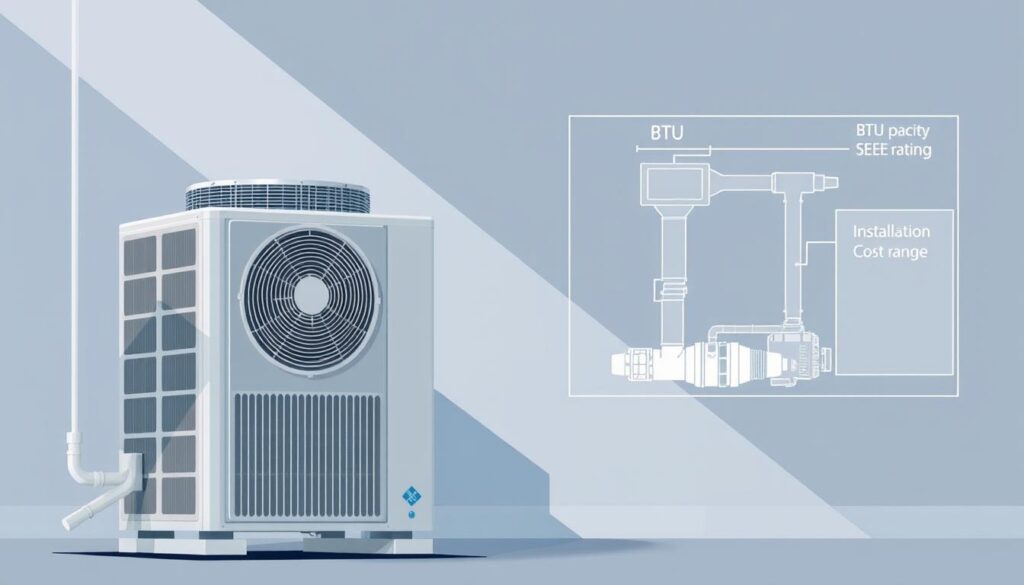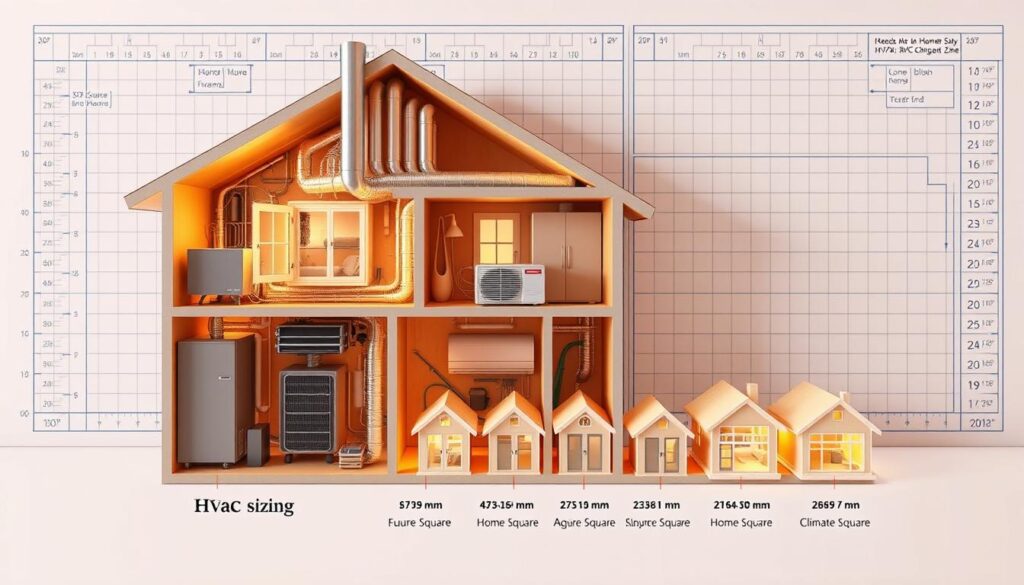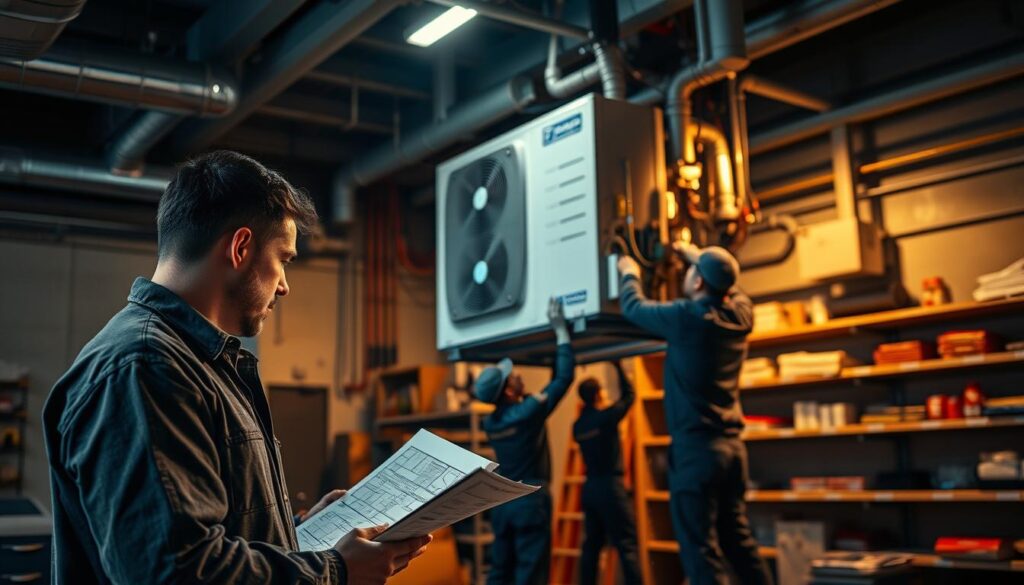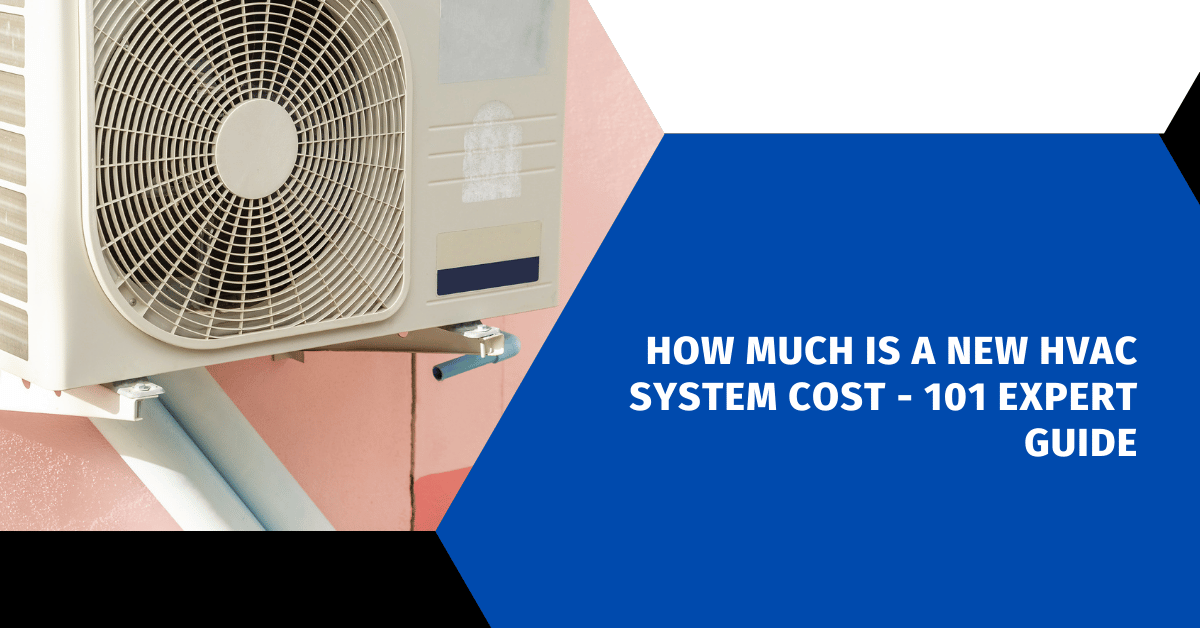Affiliate Disclosure
HVAC Guide Guys is a participant in the Amazon Services LLC Associates Program, an affiliate advertising program designed to provide a means for sites to earn advertising fees by advertising and linking to Amazon.
How Much Is A New HVAC System Cost? Are you curious about the cost of a new HVAC system? Knowing the true cost of installation is key to choosing the right system for your home. It affects both your comfort and budget.

The cost of a new HVAC system can vary. It usually falls between $3,300 and $7,800. Most people spend around $5,750 for a full installation. The price depends on your home’s size, the system’s efficiency, and local prices.
Getting a new HVAC system is a big decision. It changes your home’s comfort and your budget. Knowing the cost helps you plan and make the best choice for your home.
Key Takeaways
- Average HVAC system costs range from $3,300 to $7,800
- Installation prices vary based on home size and system type
- Energy efficiency can impact long-term cost savings
- Professional assessment is key for accurate pricing
- Think about both upfront and ongoing costs
Table of Contents
Understanding Average HVAC System Costs
Exploring the cost of heating and cooling systems can be tricky. In 2025, homeowners see a wide range of prices. These prices change based on many factors. Knowing these costs helps you choose the best for your home.
Basic Cost Ranges for Different Systems
Looking at new HVAC systems, you’ll find different prices for each type:
- Central Air Conditioning Unit: $3,000 – $7,500
- Furnace: $2,500 – $6,000
- Heat Pump: $3,000 – $10,000
- Ductless Mini-Split: $2,000 – $10,000
Factors Affecting Initial Investment
The cost of a new air conditioner and furnace is affected by several things:
- System efficiency ratings
- Brand reputation
- Technological features
- Installation complexity
Regional Price Variations
| Region | Average HVAC Cost | Climate Impact |
|---|---|---|
| Northeast | $5,500 – $8,500 | High heating demands |
| Southwest | $4,000 – $7,000 | Intense cooling needs |
| Midwest | $4,500 – $7,500 | Extreme temperature variations |
Your local market, labor rates, and climate affect the final cost. Always get multiple quotes to ensure competitive pricing.
Key Signs It’s Time to Replace Your HVAC System
Knowing when to replace your HVAC system can save you money and prevent unexpected breakdowns. Your HVAC system doesn’t last forever. Recognizing the warning signs early can help you plan for a strategic replacement before a complete system failure occurs.
Check out these critical indicators that suggest it might be time to invest in a new ac unit prices:
- System Age: Most HVAC systems last between 10-15 years. If your unit is approaching or past this age, replacement becomes more cost-effective than continuous repairs.
- Frequent Repairs: When repair costs start approaching 50% of a new system’s price, it’s time to consider replacement.
- Rising Energy Bills: Older systems work harder and consume more electricity, causing noticeable increases in monthly energy expenses.
Additional warning signs include inconsistent temperatures across different rooms, unusual noises like grinding or squealing, and strange odors when the system operates. These symptoms often indicate significant internal problems that might require a complete system overhaul.
Proactively monitoring your HVAC system’s performance can help you budget for a replacement and avoid emergency situations. Consulting with a professional HVAC technician can provide personalized insights specific to your home’s heating and cooling needs.
Explore Our HVAC Shop
Looking for top-rated HVAC tools, parts, and accessories? Visit our shop and find the perfect solution for your needs.
Visit the ShopTypes of HVAC Systems and Their Price Points
Choosing the right HVAC system is key for home comfort and managing costs. Different systems offer benefits and prices for various needs and budgets.
Knowing the average cost to install central air and other options helps homeowners make smart choices for their heating and cooling.
Central Air Conditioning Systems
Central air conditioning is a top pick for cooling homes. Prices range from $3,000 to $15,000, based on your home’s size and needs.
- Ideal for entire home cooling
- Consistent temperature control
- Improved air circulation
Heat Pump Solutions
Heat pumps are great for both heating and cooling. Prices vary from $6,000 to $25,000, with air-source and ground-source (geothermal) options.
- Air-source heat pumps: More affordable option
- Geothermal heat pumps: Higher initial cost, better long-term efficiency
- Dual functionality for heating and cooling
Furnace Options
Gas furnaces are a common heating choice, priced from $3,800 to $12,000. Electric and oil furnaces offer alternatives for different homes.
- Gas furnaces: Most common and cost-effective
- Electric furnaces: Lower upfront costs
- Oil furnaces: Less common but used in some areas
Pro tip: Think about your local climate, home size, and energy efficiency when picking an HVAC system.
How Much Is A New HVAC System Cost Based on Home Size

When you think about getting a new HVAC system, your home’s size matters a lot. HVAC experts use special math to find the perfect system for your home.
The size of your home affects how big and expensive the HVAC system needs to be. Smaller homes need less expensive systems. But, bigger homes need more powerful and expensive ones.
- Small apartments (500-1000 sq ft): Lower hvac installation price
- Medium homes (1000-2000 sq ft): Moderate system costs
- Large homes (2000-3500 sq ft): Higher HVAC system investments
Experts use Manual J load calculations to figure out what system you need. They look at things like:
- Square footage
- Ceiling height
- Insulation quality
- Local climate conditions
| Home Size | Estimated HVAC Cost Range | System Capacity |
|---|---|---|
| 500-1000 sq ft | $3,000 – $5,000 | 1.5 – 2 tons |
| 1000-2000 sq ft | $5,000 – $8,000 | 2.5 – 3.5 tons |
| 2000-3500 sq ft | $8,000 – $12,000 | 4 – 5 tons |
Choosing the right HVAC system is very important. A system that’s too small won’t keep your home comfortable. A system that’s too big wastes energy and raises your bills. Always talk to a pro to pick the best system for your home.
Explore Our HVAC Shop
Looking for top-rated HVAC tools, parts, and accessories? Visit our shop and find the perfect solution for your needs.
Visit the ShopEnergy Efficiency Ratings and Cost Impact
It’s important to understand energy efficiency ratings when looking at HVAC system prices. These ratings affect both the upfront cost and long-term savings of your HVAC system. Modern systems have advanced efficiency metrics to help you choose wisely.
- SEER (Seasonal Energy Efficiency Ratio) for cooling systems
- AFUE (Annual Fuel Utilization Efficiency) for heating systems
SEER Ratings Explained
SEER ratings show how much cooling a system gives compared to the energy it uses. A higher SEER rating means a system is more efficient. While systems with higher SEER ratings cost more at first, they save you money in the long run.
Long-term Savings
Choosing a high-efficiency HVAC system can save you a lot of money. A system with a higher SEER rating can cut your annual energy costs by 20-40%. Even though the initial cost is higher, the savings over time can make up for it.
- Lower monthly utility bills
- Reduced environmental impact
- Potential tax credits and rebates
Remember, every increase in SEER rating means more energy saved and lower costs for your home.
Installation Costs and Labor Considerations

When you’re planning to replace your heating and cooling system, knowing the installation costs is key. The cost of installing an HVAC system is more than just the equipment. It also includes skilled labor, careful planning, and precise execution.
Several factors affect your installation costs:
- Complexity of the HVAC system layout
- Home’s existing infrastructure
- Local labor rates
- Permit and inspection requirements
- Potential ductwork modifications
Choosing a qualified HVAC contractor is important. They might charge more, but they ensure your system is installed right. This can save you money on repairs later. Expect to pay 30-50% of the total cost for installation.
Professional tip: Always request detailed written quotes from multiple licensed contractors to compare installation costs accurately.
Your home’s unique features can lead to specific installation challenges. Older homes might need more ductwork updates, which can increase costs. The location, electrical system, and local building codes also affect the final cost.
To avoid unexpected costs, consider these tips:
- Get a thorough home assessment
- Check the contractor’s credentials
- Understand any structural changes needed
- Plan for any unexpected expenses
Spending time on research can help you manage your HVAC installation budget well.
Explore Our HVAC Shop
Looking for top-rated HVAC tools, parts, and accessories? Visit our shop and find the perfect solution for your needs.
Visit the ShopAdditional Features and Their Price Impact
Modern HVAC systems come with advanced features that boost your home’s comfort and efficiency. These features might raise ac unit prices. Yet, they offer long-term benefits for homeowners.
Adding innovative features to your HVAC system can change your home’s comfort and energy use. Let’s look at the most important add-ons for better heating and cooling.
Smart Thermostat Integration
Smart thermostats are a big leap in home climate control. They can:
- Learn your temperature preferences
- Automatically adjust settings for maximum efficiency
- Reduce energy consumption by up to 15%
- Provide remote control via smartphone apps
Prices for smart thermostats vary from $200 to $500. The savings on energy can make up for the cost.
Air Quality Improvements
Improving your indoor air quality can greatly benefit your health and comfort. Here are some advanced air treatment options:
- Whole-house air purifiers
- Advanced filtration systems
- Humidity control units
- UV light air sanitization
Investing in air quality improvements can reduce allergens and create a healthier living environment.
Zoning Systems
Zoning systems let you control the temperature in different parts of your home. By dividing your space into zones, you can:
- Customize temperature for individual rooms
- Eliminate hot and cold spots
- Reduce energy waste
- Improve overall comfort
Professional HVAC experts recommend zoning systems for homes with multiple levels or unique architectural designs.
While these features may raise initial costs, they offer long-term benefits in comfort, efficiency, and energy savings.
Financing Options and Government Incentives
Dealing with hvac replacement costs can be tough for homeowners. Luckily, there are many financing options to help make prices more affordable. Knowing about these financial paths can really help lower your costs.
Government incentives are also key in reducing hvac system costs. The federal government has several programs to help with energy-efficient home upgrades:
- Federal tax credits for energy-efficient HVAC systems
- Energy Star rebate programs
- Local utility company incentives
Here are some financing options for hvac system prices:
- Manufacturer Financing: Direct payment plans from HVAC manufacturers
- Personal Loans: Unsecured options from banks and credit unions
- Home Equity Loans: Lower interest rates using home equity
| Financing Option | Interest Rate | Typical Term |
|---|---|---|
| Manufacturer Financing | 0-7.99% | 12-60 months |
| Personal Loans | 6-36% | 24-84 months |
| Home Equity Loans | 3-8% | 60-240 months |
Before picking a financing option, look into government incentives in your area. Check with local utilities, state energy offices, and federal tax credit programs. This can help you save a lot on hvac replacement costs.
Explore Our HVAC Shop
Looking for top-rated HVAC tools, parts, and accessories? Visit our shop and find the perfect solution for your needs.
Visit the ShopMaintenance Requirements and Long-term Costs
Knowing how to take care of your HVAC system is key when thinking about the cost of a new one. Regular upkeep can lower the cost of installing central air and make your system last longer.
Keeping your HVAC in good shape stops sudden failures and keeps it running well. Here are important maintenance steps to follow:
- Replace air filters every 1-3 months
- Schedule professional annual inspections
- Clean air vents and registers quarterly
- Check refrigerant levels
- Inspect electrical connections
The cost of HVAC upkeep changes based on your system and how much you use it. Here’s a look at what you might spend each year on maintenance:
| Maintenance Task | Estimated Annual Cost |
|---|---|
| Air Filter Replacement | $50-$200 |
| Professional Inspection | $100-$300 |
| Minor Repairs | $150-$500 |
Pro tip: Spending on upkeep can save you a lot on big repairs and boost your system’s energy use.
Doing maintenance yourself can cut costs. Simple tasks like cleaning air vents, swapping out filters, and keeping outdoor units clear can avoid pricey fixes. But, for tough problems, it’s best to get a pro HVAC tech.
Conclusion
Getting a new HVAC system is a big step in improving your home. The cost can change a lot based on your home’s size, how efficient the system is, and where you live. Knowing these things helps you choose wisely, balancing the cost now with the benefits later.
When looking at hvac upgrade costs, the cheapest isn’t always best. Systems that save energy might cost more at first but save you money every month. A pro can help find the best fit for your home, saving you money in the long run.
Planning is key when setting a budget for your home’s heating and cooling. Look into financing options, check for government help, and think about how long the system will last. Your choice is more than just about the temperature. It’s about making your home comfortable and efficient, adding value and improving your life.
Don’t rush when comparing prices and looking at different systems. Focus on energy efficiency. With the right research, you’ll find a system that keeps you comfortable, saves energy, and adds lasting value to your home.
FAQ
What is the average cost of a new HVAC system in 2025?
How do I know when it’s time to replace my HVAC system?
What factors affect the cost of a new HVAC system?
How does home size impact HVAC system pricing?
What are the most energy-efficient HVAC system options?
Are there financing options available for HVAC system purchases?
How much does HVAC installation typically cost?
What is the average cost of a new HVAC system in 2025?
How do I know when it’s time to replace my HVAC system?
What factors affect the cost of a new HVAC system?
How does home size impact HVAC system pricing?
What are the most energy-efficient HVAC system options?
Are there financing options available for HVAC system purchases?
How much does HVAC installation typically cost?
FAQ
What is the average cost of a new HVAC system in 2025?
The cost of a new HVAC system varies. It can be between ,000 and ,000. This depends on the type of system, your home’s size, and how efficient it is. Central air units cost between ,500 and ,500. Replacing both heating and cooling can cost ,000 to ,000.
How do I know when it’s time to replace my HVAC system?
It’s time to replace your HVAC if it’s over 10-15 years old. If it needs frequent repairs or doesn’t heat or cool well, it’s time for a new one. Also, if it uses a lot of energy or makes strange noises, it’s time for a change.
What factors affect the cost of a new HVAC system?
Several things affect the cost of a new HVAC system. These include your home’s size, the type of system, and how efficient it is. The brand, how hard it is to install, and local labor costs also play a role. Features like smart thermostats can add to the cost.
How does home size impact HVAC system pricing?
Your home’s size affects the cost of an HVAC system. Bigger homes need more powerful systems, which cost more. HVAC experts use Manual J load calculations to find the right size for your home.
What are the most energy-efficient HVAC system options?
High-efficiency heat pumps and systems with high SEER ratings are the most energy-efficient. Look for units with SEER ratings of 16 or higher and ENERGY STAR certification. Geothermal heat pumps are the most efficient but are more expensive upfront.
Are there financing options available for HVAC system purchases?
Yes, there are financing options. You can get financing from manufacturers, home equity loans, personal loans, or government incentives. Many utility companies and government programs offer rebates and special financing for energy-efficient systems.
How much does HVAC installation typically cost?
Installation costs vary from
FAQ
What is the average cost of a new HVAC system in 2025?
The cost of a new HVAC system varies. It can be between $5,000 and $12,000. This depends on the type of system, your home’s size, and how efficient it is. Central air units cost between $3,500 and $7,500. Replacing both heating and cooling can cost $6,000 to $15,000.
How do I know when it’s time to replace my HVAC system?
It’s time to replace your HVAC if it’s over 10-15 years old. If it needs frequent repairs or doesn’t heat or cool well, it’s time for a new one. Also, if it uses a lot of energy or makes strange noises, it’s time for a change.
What factors affect the cost of a new HVAC system?
Several things affect the cost of a new HVAC system. These include your home’s size, the type of system, and how efficient it is. The brand, how hard it is to install, and local labor costs also play a role. Features like smart thermostats can add to the cost.
How does home size impact HVAC system pricing?
Your home’s size affects the cost of an HVAC system. Bigger homes need more powerful systems, which cost more. HVAC experts use Manual J load calculations to find the right size for your home.
What are the most energy-efficient HVAC system options?
High-efficiency heat pumps and systems with high SEER ratings are the most energy-efficient. Look for units with SEER ratings of 16 or higher and ENERGY STAR certification. Geothermal heat pumps are the most efficient but are more expensive upfront.
Are there financing options available for HVAC system purchases?
Yes, there are financing options. You can get financing from manufacturers, home equity loans, personal loans, or government incentives. Many utility companies and government programs offer rebates and special financing for energy-efficient systems.
How much does HVAC installation typically cost?
Installation costs vary from $1,000 to $3,500. This depends on the job’s complexity. Factors include ductwork changes, the installation area’s accessibility, local codes, and the need for permits or system changes.
What additional features can increase HVAC system costs?
Features like smart thermostats, whole-house air purifiers, zoning systems, and advanced humidity control can increase costs. While they add to the upfront cost, they can improve comfort and energy efficiency over time.
How often should I maintain my new HVAC system?
You should have your HVAC system checked twice a year. Once for heating and once for cooling. Regular inspections, filter replacements, and basic maintenance can prevent expensive repairs and extend your system’s life.
What type of HVAC system is best for my home?
The best HVAC system depends on your needs. Consider your climate, home size, budget, and energy goals. A professional HVAC contractor can assess your home and recommend the best system for you.
,000 to ,500. This depends on the job’s complexity. Factors include ductwork changes, the installation area’s accessibility, local codes, and the need for permits or system changes.
What additional features can increase HVAC system costs?
Features like smart thermostats, whole-house air purifiers, zoning systems, and advanced humidity control can increase costs. While they add to the upfront cost, they can improve comfort and energy efficiency over time.
How often should I maintain my new HVAC system?
You should have your HVAC system checked twice a year. Once for heating and once for cooling. Regular inspections, filter replacements, and basic maintenance can prevent expensive repairs and extend your system’s life.
What type of HVAC system is best for my home?
The best HVAC system depends on your needs. Consider your climate, home size, budget, and energy goals. A professional HVAC contractor can assess your home and recommend the best system for you.

